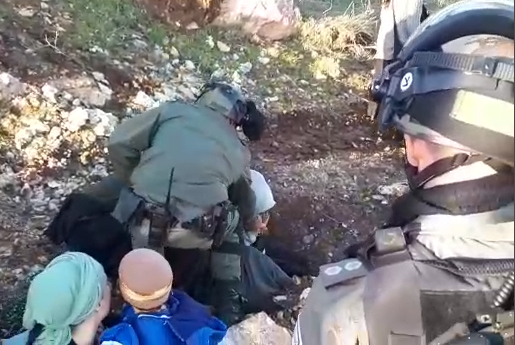Sunday, October 17, 2021, 10:56 In February 2020, the border police brutally assaulted youths passively protesting the impounding of construction equipment at Geulat Tzion in the Binyamin region. Video clips documenting the incident reveal a particularly violent confrontation on the part of the border policemen who violated guidelines for the use of tear gas, including the prohibition of using tear gas on small children, in proximity to innocent people liable to be injured, and on people passively resisting detention. Additionally, medics were initially prevented from providing treatment.
Honenu Attorney Menashe Yado assisted the injured protesters in filing a complaint with the Police Investigation Unit (PIU), and after an investigation that lasted a year, the PIU decided to put one border policeman and one border policewoman on disciplinary trial. Among the policewoman’s illegal actions, she sprayed tear gas at a young woman who had already been subdued and sprayed tear gas at a young woman at point-blank range and pulled her by her hair, which was documented in a video clip.
Young woman dragged by her hair; Video credit: Geulat Tzion
To his surprise, Honenu Attorney Menashe Yado discovered that the case against the border policewoman was closed, because she completed her compulsory army service. When Yado requested that she be indicted in a civil, criminal case, he was informed that within three weeks of her discharge, despite the indictment outstanding against her, she had re-enlisted in the police force, which prevents serving her with a civil indictment. Yado demanded that Police Commissioner Kobi Shabtai investigate the matter.
In a letter he sent to Commissioner Shabtai, Yado wrote that “in this case there seems to be problematic conduct, with all due respect, of the Israeli Police regarding accepting the policewoman into the ranks of the police and regarding the process through which it was illegally decided not to put the border policewoman on disciplinary trial.”
Yado described the police conduct in his letter: “In a phone call I made to the disciplinary department to verify the status of the complaint, I was informed that a disciplinary indictment would be filed against only the border policeman, and not against the border policewoman. I then sent a letter to the disciplinary department demanding to know the grounds for exempting the policewoman from disciplinary indictment, contrary to the order by the PIU. Superintendent Ostrovsky from the disciplinary department responded to my letter stating that the reason for not filing a disciplinary indictment against the border policewoman was that she completed her compulsory service and left the police.”
Simultaneously, Yado discovered that the border policewoman had committed additional illegal acts at the protest: “Approximately three months later, I sent another letter to the PIU in which I reported two additional assaults with tear gas by the border policewoman [at the protest]. These are two different instances in which the border policewoman sprayed minors with tear gas at point-blank range, although they were completely subdued. The documentation of these two additional assaults was not in the possession of the young women when the original complaint was filed. The documentation was transferred to Honenu only later.”
In response to the new details revealed by Honenu, Yado asked to examine the decision made against the border policewoman in order to consider filing a civil, criminal indictment against her. He was surprised to discover that it was not possible, because the policewoman had returned to the ranks of the police – only three weeks after the announcement that she had completed her service.
Yado described this in his letter to the police commissioner. “The grounds for the astounding rejection [of the request for a criminal indictment], one must say, are that the policewoman returned to police service, and therefore it is again possible for her to be put on disciplinary trial, and that will be done, and therefore she will not be put on criminal trial. It is glaringly obvious to all that this is outrageous conduct that raises many questions. The most surprising thing to arise is the length of time after which the policewoman returned to the police ranks.
“When did the policewoman have time to return? Only three weeks elapsed! Who accepted her back into the ranks when she had an extremely serious indictment hanging over her head for cruelly spraying tear gas at point-blank range at minors, contrary to the regulations and contrary to basic human sentiment, needlessly and without legal justification?! Was the acceptance process done with consideration of the indictment?” wondered Yado.
Honenu Attorney Menashe Yado leveled sharp criticism at the police: “With this incident, the police acted such that the manner in which the policewoman left the police and then returned created a detour avoiding an indictment. The policewoman left, and therefore was not indicted. After a time elapsed during which she could have been indicted, she returned to the ranks of the police, and thus stood to be exempt from indictment. It is inconceivable that the Israeli Police allowed the policewoman to evade a disciplinary process over her actions by leaving and then returning to the police ranks.
“The police procedure for exempting the policewoman from a disciplinary trial is a serious act that endangers the rule of law. It is obvious that the police must do a deep house cleaning over this matter and draw the correct conclusions. If the return of the policewoman, which damages the police, is not canceled, or alternatively, if she is not suspended until a ruling is reached in her case, we intend to appeal to the High Court of Justice.”

